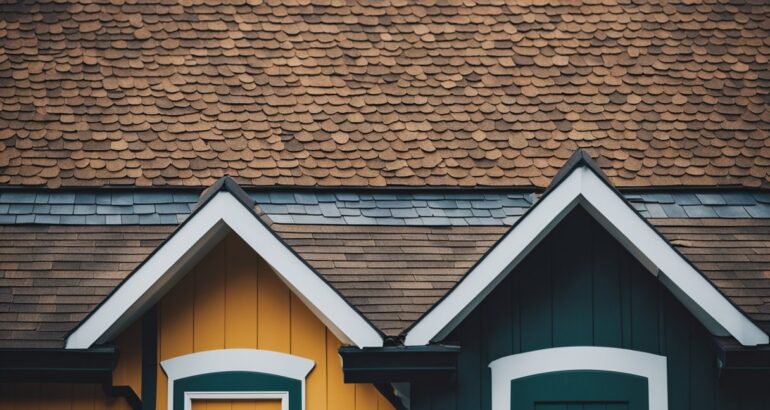
When it comes to selecting roofing materials, homeowners often find themselves weighing the merits of asphalt shingles vs composite shingles. The choice is significant as it affects both the aesthetic appeal of the home and its long-term durability. Asphalt shingles are the conventional choice, celebrated for their cost-effectiveness and widespread availability. Their ease of installation and range of styles make them a go-to option for many.

In contrast, composite or cedar shingles offer enhanced durability than asphalt with a higher resistance to environmental factors. Made from engineered materials, composite shingles can withstand winds of up to 180 miles per hour, reflecting their robustness against severe weather conditions. The longevity and performance of composite shingles have positioned them as a strong alternative to asphalt, although at a typically higher cost.
Asphalt is not the same as composite; the former is primarily made of asphalt and either fiberglass or organic materials, while the latter comprises various synthetic compounds. While some homeowners prioritize the initial savings of asphalt, others opt for the long-term benefits that composites provide. The debate between asphalt and composite shingles hinges on an individual’s priorities, whether upfront cost, maintenance, longevity, or aesthetic preference.
Comparative Analysis: Asphalt Shingles vs. Composite

In considering roofing materials, homeowners often weigh the qualities of asphalt shingles against composite shingles. Key differentiators include material composition, longevity, and maintenance demands, influencing overall performance and suitability.
Material Composition
Asphalt shingles are primarily made from organic felt or fiberglass saturated with asphalt and coated with mineral granules. On the other hand, composite shingles consist of a mixture of various synthetic materials, including rubber, plastic, and fiberglass, which aim to mimic the appearance of natural materials like slate or wood.
Durability and Longevity
- Asphalt Shingles: They typically have a lifespan ranging from 10 to 50 years, influenced by the quality and type. Three-tab shingles last about 15-20 years, while architectural asphalt shingles are thicker and more durable.
- Composite Shingles: These can last 3 to 4 times longer than three-tab asphalt shingles, with some brands offering up to 50 years of warranty, and are known to withstand severe weather conditions more effectively.
Maintenance Requirements
Asphalt Shingles: Require regular maintenance to ensure maximum lifespan, including inspections for lifting or missing shingles, especially after severe weather events. They can be more susceptible to algae and moss.
Composite Shingles: Generally demand less maintenance due to their durability and resistance to environmental factors. They are less prone to algae and moss growth, reducing maintenance frequency.
Cost Considerations: Asphalt Shingles vs Composite
When considering roofing materials, a key factor for homeowners is the balance between upfront investment and long-term value. Asphalt shingles generally offer a lower initial cost, while composite shingles are recognized for their durability and can present better long-term value.
Initial Installation Cost
Asphalt shingles are known for their cost-effectiveness concerning initial installation. They may range from $5,994 to $9,791 for a 2,000-square-foot home with a standard slope. It’s important to note that this cost can vary based on the type of asphalt shingle chosen.
- Architectural Asphalt Shingles: Higher quality with a more dimensional look.
- Three-Tab Asphalt Shingles: More economical and simpler in appearance.
In contrast, composite shingles exhibit a broader range, with costs typically starting from $7.50 to $14.50 per square foot installed. Extra expenses might be incurred for the removal and disposal of old materials.
- Composite Shingle Removal and Disposal: Add $0.80-$1.35/sq.ft. for asphalt shingles.
- Tile Removal and Disposal: Add $1.00-$2.00/sq.ft. for heavier materials like clay or slate.
Long-Term Value
Composite shingles often provide significant long-term value due to their longevity and durability. Although the initial installation cost is higher than asphalt shingles, composite shingles may offer more robust protection against environmental factors, potentially leading to a longer lifespan and fewer replacements.
While more affordable upfront, asphalt shingles typically have a shorter lifespan and may require more frequent maintenance or replacement, which could diminish their long-term value compared to composite options.
Advantages and Disadvantages: Asphalt Shingles vs Composite

When homeowners consider roofing materials, they often weigh the pros and cons of asphalt shingles and composite shingles. Here’s a breakdown of each material’s strengths and weaknesses.
Asphalt Shingles Advantages:
- Cost-Effective: With a price range of $1.50 to $5.50 per square foot, they are one of the most affordable roofing options.
- Easy Installation: Asphalt shingles can often be installed quickly, reducing labor costs.
- Variety of Styles: These shingles are available in various colors and designs.
Asphalt Shingles Disadvantages:
- Shorter Lifespan: Typically, asphalt shingles last between 25-28 years.
- Less Durable: They may be less resistant to extreme weather conditions, resulting in a higher likelihood of damage and the need for more frequent replacements.
Composite Shingles Advantages:
- Longevity: A composite shingle roof can last 40-50 years due to its impact-resistant properties.
- Weather Tolerance: These shingles perform better in areas with high winds or within a tornado zone as they can withstand more severe weather conditions.
Composite Shingles Disadvantages:
- Higher Cost: A composite shingle roof can be around 3 to 4 times more expensive than an asphalt shingle roof, costing an average of approximately $4.76 per square foot.
- Heavier: Composite shingles are often heavier than asphalt, which may require additional structural support.
In essence, asphalt and composite shingles are not the same. Asphalt shingles are primarily made from fiberglass or organic materials saturated with asphalt. In contrast, composite shingles have various synthetic materials, making them different in composition and performance.
Freddy & Son – The Best Asphalt Roof Installers in Virginia
Freddy & Sons excels as Virginia’s go-to asphalt roof installers. Their unique “Freddy and Son Way” ensures perfect installations by following strict rules and using experienced workers. They specialize in the best asphalt shingles that last long and look great, protecting homes from tough weather. They also offer cedar and slate roofs for timeless, natural looks.
What sets them apart is their dedication to happy customers. They promise a 100% satisfaction guarantee, showing they care about quality and trust. With over 25 years of experience, big teams like the Washington Capitals and Wizards have trusted them. They’re licensed in Virginia, Maryland, DC, and Pennsylvania, serving areas like Fairfax, Leesburg, and Arlington.
Freddy & Sons stands out for their top-quality roofing installation slate roofing installation in Virginia and commitment to ensuring every customer gets the best. Whether it’s homes or businesses, they’re the ones people turn to for top-notch roofing services in Virginia.



